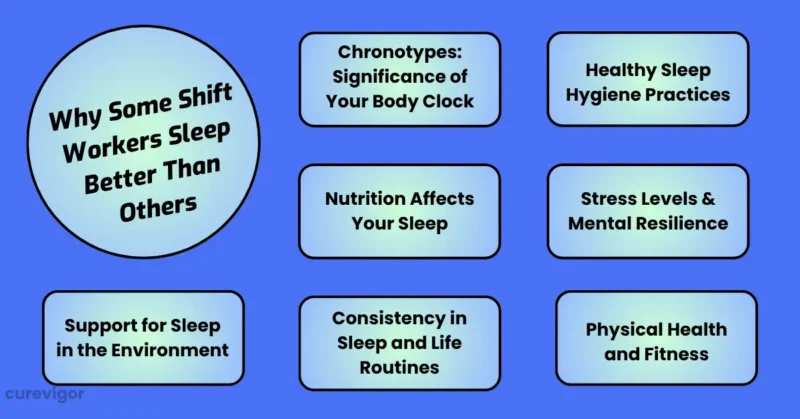Ever wonder why some shift workers sleep better than others? Learn the unexpected routines, habits, and health tips that improve sleep quality even with non-traditional work schedules.
Thank you for reading this post, don't forget to subscribe!While some night shift workers experience persistent fatigue, others wake up feeling rejuvenated. What’s the trick? Lifestyle, habits, and even biology hold the key to the solution. Certain routines, sleep environments, and dietary choices help shift workers sleep better, even when working against the body’s natural rhythm. In this article, we’ll explore what sets good sleepers apart—and how you can join them.
Why Some Shift Workers Sleep Better Than Others
Key Habits That Make a Difference
Not all shift workers suffer the same fate when it comes to sleep. While some toss and turn or rely on sleep aids to function, others seem to drift off easily after every shift and wake up refreshed. Why the difference? The truth is that several physical, psychological, and behavioral factors contribute to whether a shift worker sleeps well or not. Even if your work schedule isn’t perfect, the first step to turning sleepless nights into restorative sleep is to recognize these tendencies.

1. Chronotypes: The Significance of Your Body Clock
Have you ever wondered why, while you’re drinking coffee and counting down the minutes until dawn, your coworker appears to breeze through night shifts? The answer may lie in something you were born with: your chronotype—aka your internal sleep-wake clock. Some of us are natural night owls who feel energized when the moon is high, while others are early birds who crash hard once the sun sets.
Shift workers who naturally lean toward a later chronotype often find it easier to adjust to overnight hours. They can fall asleep during the day and feel more alert at night. Meanwhile, morning-types may struggle with staying awake during late shifts or falling asleep after sunrise—no matter how tired they feel.
Here’s the good news: once you identify your chronotype, you can work with it instead of fighting against it. For example, if you’re a natural early riser working night shifts, you can use bright light therapy during your shift to stay alert and wear blue-light-blocking glasses on your way home to encourage melatonin release. Understanding and respecting your internal rhythm is one of the key reasons some shift workers sleep better than others—it’s not magic; it’s science and smart strategy!
2. Healthy Sleep Hygiene Practices
Let’s be honest: sleep doesn’t just “happen” after a night shift. Especially when the sun is shining, the world is noisy, and your body thinks it’s time to be awake. That’s why good sleep hygiene isn’t optional—it’s your secret weapon.
What exactly does that mean? It’s about creating a consistent routine that trains your brain and body to wind down at the same time each day—even on your days off. The shift workers who sleep better aren’t necessarily less tired; they’ve just built powerful habits. They keep their bedroom cool and dark, use blackout curtains, skip the post-shift scroll through Instagram, and steer clear of caffeine after the halfway mark of their shift.
These tiny rituals might not seem like much on their own, but together, they create a sleep-friendly environment that signals to your brain: “It’s time to rest.” Over time, this regularity helps you sleep more soundly and deeply while also improving the time it takes to fall asleep.
Look to the habits of superior sleepers if you’re sick of waking up drowsy and dragging through your shift. They serve as evidence that shift workers who prioritize rest over afterthoughts sleep better despite their demanding schedules.
3. Nutrition: What You Eat Affects How You Sleep
Let’s talk about food—not just what you eat, but when you eat it. Because here’s the truth: what’s on your plate can either invite sleep in like a cozy friend or slam the door shut on it entirely. Shift workers who sleep better are aware of this and plan their meals with sleep in mind.
Heavy, greasy meals or sugary snacks might sound comforting after a long shift, but they can lead to bloating, spikes in blood sugar, and that dreaded 2 p.m. crash—right when you’re supposed to be asleep. Late-night spicy takeout or energy drinks? Those are practically an alarm clock for your nervous system.
On the other hand, foods rich in magnesium, tryptophan, and complex carbohydrates—such as a bowl of warm oatmeal, a banana, or even a slice of turkey—can help your body naturally transition into sleep mode. These nutrients support melatonin production and help your nervous system relax. Want an easy trick? Pair a carb with a little protein an hour before bed. It’s a delicious way to signal to your brain: “Hey, it’s bedtime.”
4. Stress Levels and Mental Resilience
Let’s face it—shift work can be stressful. Unpredictable hours, demanding roles, and limited time with loved ones can all take a toll on your mental well-being. But the difference between those who spiral into sleeplessness and those who rest well often comes down to how they manage stress.

Shift workers sleep better when they have a toolbox of coping techniques. That might mean journaling for 10 minutes after a shift to clear your head, doing a quick yoga stretch, or practicing mindfulness meditation to ease tension. Even talking it out with a friend or therapist can help your brain offload the day.
On the flip side, stress that lingers—unspoken, unprocessed—keeps the mind racing. Adrenaline lingers, your body remains vigilant, and falling asleep seems unattainable. Therefore, treat your mental health in the same manner that you would your nutrition or physical activity. It’s necessary for excellent sleep, not a luxury.
5. Support for Sleep in the Environment
Imagine attempting to sleep while your room feels like a sauna, dogs are barking outside, and sunlight is pouring in. Not the best. Your sleep environment matters—a lot. The most well-rested shift workers know that their bedroom should feel like a sanctuary, no matter the hour.
Blackout curtains? Non-negotiable. White noise machine or earplugs? Yes, please. Blue light-blocking sunglasses for the walk home? Game changer. These simple tools can dramatically improve your ability to fall asleep faster and stay asleep longer, especially during daylight hours.
Even the temperature of your room makes a difference. Aim for a calm and quiet space, and eliminate clutter if possible. The more peaceful your space, the more relaxed your brain is. Think of it this way: you’re setting the stage for sleep, and every thoughtful touch makes your body say, “Ah, it’s time to rest now.”
No surprise—shift workers sleep better when they sleep smart. And it all starts with the space you create.
6. Consistency in Sleep and Life Routines
Think of your body like a rhythm-loving orchestra—it plays best when it sticks to the same beat. That’s why consistency is one of the most potent (yet underrated) tools for better sleep. Shift workers who sleep better don’t just wing it on their days off. They adhere to a regular sleep-wake schedule, whether it’s a workday or a weekend, which helps keep their internal clock tuned and steady.
It’s tempting to stay up late with friends on your off days or “catch up” on sleep by sleeping till noon, but those shifts can confuse your circadian rhythm. Your body doesn’t know what to expect—and that confusion can mess with melatonin release, energy levels, and even your digestion.
And it’s not just sleep timing that matters. Eating meals at consistent hours, exercising regularly (even lightly), and winding down the same way each night signals safety and calm to your brain. Over time, these micro-routines train your body to sleep more easily and deeply—just one more reason why shift workers sleep better when they stick to the rhythm.
7. Physical Health and Fitness
Here’s some energizing news: you don’t have to run marathons to enjoy better sleep. Regular movement—even something as simple as a brisk walk or a quick yoga session—can dramatically improve how well you rest. Why? Exercise reduces stress, balances your hormones, and helps your body naturally shift into a restful state once it’s time to sleep.
Shift workers sleep better when they prioritize their physical health. Staying active boosts serotonin during the day and supports melatonin production later. It also helps manage blood sugar and reduces the chances of night-time restlessness or hot flashes that interrupt sleep.
Even better—exercise gives you a natural energy boost during shifts and helps you wind down more smoothly after them. So whether it’s a dance class, a light jog, or walking the dog after your shift, movement is more than a wellness goal—it’s a ticket to more peaceful sleep.
Real-Life Comparison: Two Shift Workers, Two Outcomes
Let’s bring this all to life with a quick story. Meet Jane and Mark—both ICU nurses working the same rotating night shifts. They work the same hours, deal with the same stress, and see the same patients. But their sleep lives? Different.
Jane often wakes up groggy and depends on sleep aids to feel halfway normal. Her routine? Scrolling on her phone in bed, eating fast food after shifts, skipping exercise, and sleeping with the blinds open. She wants better sleep, but her habits aren’t helping.
Then there’s Mark. He sleeps a solid 7 hours almost every day. What’s his secret? He winds down with a book instead of a screen, wears blue-light glasses on the way home, eats a light meal after his shift, and exercises for 20 minutes most evenings. He keeps his room cool and dark, even using a white noise machine to create a soothing atmosphere. The result? He falls asleep faster, stays asleep longer, and wakes up feeling like his old self.
Same job. Same schedule. Different results. Why? Because shift workers sleep better not just because of when they sleep—but how they support their sleep with thoughtful, consistent choices.
Conclusion: The Real Reason Some Shift Workers Sleep Better Than Others
The secret behind why some shift workers sleep better than others isn’t luck—it’s intention. From understanding your chronotype to building sleep-friendly habits around food, light, stress, and the environment, better rest is entirely achievable—even when you work against the sun.
Those who thrive on night shifts aren’t necessarily superhuman—they’re just consistent. They pay attention to their bodies’ needs because they understand what works for them. Simple actions, such as avoiding caffeine after a certain hour, exercising regularly, creating a bedroom that supports good sleep, and maintaining a consistent weekend routine, can lead to significant improvements in their well-being.
So, if you’ve been struggling to sleep well after your shifts, know this: it’s not the job that’s working against you—it’s the habits that need a tune-up. With the proper adjustments and a little patience, you too can become one of those rare (but real!) people who can proudly say: “Shift workers sleep better—and I’m one of them.”
Ready to turn your nights around? Start small, stay consistent, and prove that shift workers really can sleep better—with the proper habits in place.
Read more Health and Wellness Tips for a healthier you!
You might like:

